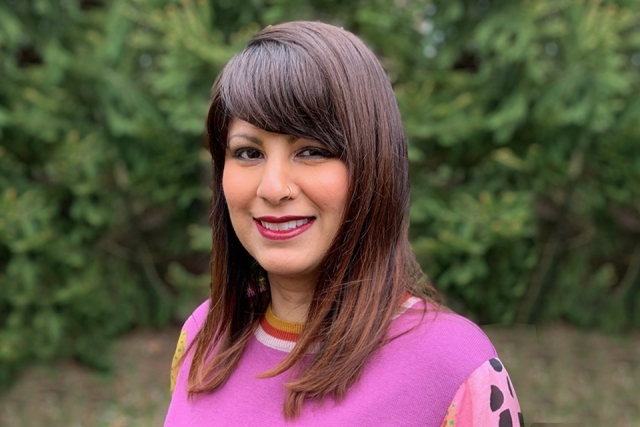
A recent St. John’s-sponsored study finds the food and health-care security of Native Americans and people of color in New York City have been adversely impacted during the pandemic.
“This study highlights an urgent need to reduce racial disparities in food and health-care security through culturally tailored programs among urban Native Americans and people of color,” said Preety Gadhoke, Ph.D., M.P.H., Associate Professor of Public Health at St. John’s University, and lead investigator for the study.
Conducted in partnership with St. John’s Vincentian Institute for Social Action, St. John’s University launched an anonymous online survey last summer to identify the stresses individuals are experiencing as a result of the outbreak, with the goal of developing immediate and future solutions to improve access to food and health care. It is an adaptation of a validated survey the University of Vermont and Johns Hopkins University developed to assess the impact of COVID-19 on food access. Dr. Gadhoke’s study was designed to uniquely measure health-care insecurity, as compared to the original survey.
Dr. Gadhoke led the study in New York City and the surrounding metropolitan region, in collaboration with the National Food Access and COVID Research Team. In addition to the five boroughs of New York City, the other areas included in the survey were Long Island, Westchester County, and Rockland County in New York; Bergen and Hudson counties in New Jersey; and Fairfield County in Connecticut.
Researchers are striving to better understand the stresses people are facing to meet their daily household needs during the pandemic, such as access to food, housing, employment, transportation, and health care, as well as general concerns and opinions of the public health and government emergency response.
Dr. Gadhoke noted the study highlighted severe racial disparities in food and health-care insecurity among all racial and ethnic groups in the greater New York City metropolitan area: Native Americans, Blacks, Hispanics, Asians, and those who are Multiracial.
“Native Americans particularly stood out in our data as having experienced the greatest disparities in our study sample,” she said.
Details of several of the study’s key findings include
- Since the onset of COVID-19, Native Americans experience the greatest food insecurity, followed by Multiracial groups, Asians, Blacks, and Hispanics.
- All racial and ethnic groups included in the study report high concerns for their households’ future well-being regarding health-care security, including concerns about medical expenditures and access to health care.
- All racial and ethnic groups in the survey report living with chronic health conditions and living in a high-risk household, with Native Americans reporting the highest rates of living with chronic health conditions and living in high-risk households.
- All racial and ethnic groups report a high level of worry about not being able to meet their household food and nutritional needs.
A surprise finding, Dr. Gadhoke said, is that the study reveals a greater magnitude than was expected in the ways in which all racial and ethnic groups have been impacted by COVID-19 and respond to challenges.
“For example,” she said, “food-related worries about not being able to meet the food and nutritional needs of one’s household are highest among Whites and lowest among Native Americans and Asians.” The lower food-related worries may be explained by the fact that they were already experiencing much higher rates of food insecurity than Whites and have resilient coping strategies.
In addition, Native Americans are the most likely to not have any health insurance compared to Asians and Multiracial groups. This is concerning, as it suggests greater synergistic disparities in this group.
To combat the racial disparities the study revealed in food and health-care security during the pandemic, Dr. Gadhoke called for the improvement of existing policies and establishment of health education programs that reflect much greater cultural sensitivity and inclusivity through increased numbers of languages, including Native American languages, “that honor and address the heterogeneity within, and diverse needs of, each racial and ethnic group. This requires an alignment of transdisciplinary and multisectoral knowledge, training, and practices, such as medical and nutritional anthropologists.”
She explained, “This is necessary to build social resilience among New Yorkers and be better prepared for future crises. In order to build resilient communities, we need to build resilient health systems.”
Related News
Founder’s Week Celebration Lights Hearts on Fire at St. John’s
St. Vincent de Paul was a practical man of action. He was a master at building teams composed of the most talented people suited to his cause. His passion motivated others; he set hearts on fire.
New Academic Year Celebrated by Honoring and Welcoming Faculty
On the eve of each new academic year—before the bustle that naturally comes with new and returning students—St. John’s University always takes a moment to pause and reflect on the critical contributions made by its faculty, honoring their service and welcoming its newest members.
St. John’s Embraces the AI Frontier: Preparing Students for a Human-Centered Future
At St. John’s University, artificial intelligence (AI) isn’t just a trending topic—it’s fast becoming an integral part of how students learn, create, and prepare for the world ahead.
